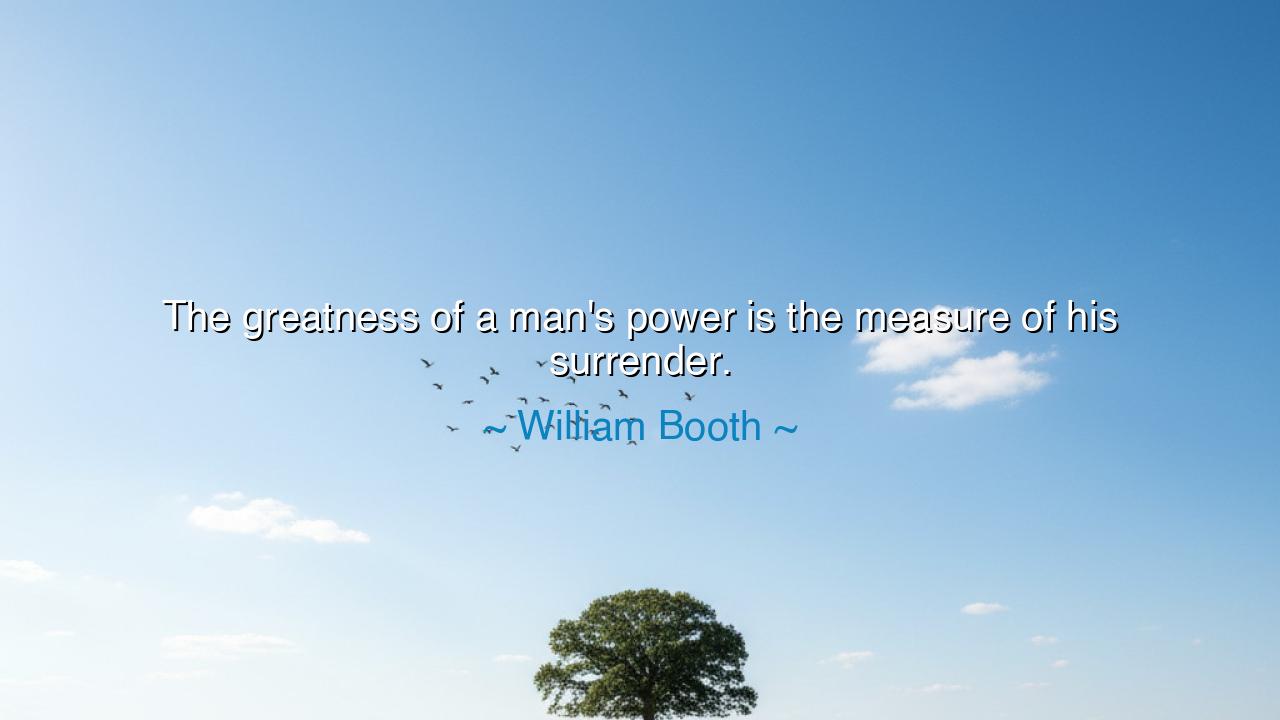
The greatness of a man's power is the measure of his surrender.






“The greatness of a man's power is the measure of his surrender.” These words from William Booth, founder of the Salvation Army, carry a profound truth about the nature of power and humility. In a world often fixated on domination and control, Booth reminds us that true greatness comes not from the ability to impose one's will on others, but from the surrender of one’s ego and desires in service to a higher cause. The greatest power is not a force that is wielded selfishly, but one that is shaped by the act of giving oneself up in humble service. Surrender becomes the key that unlocks the door to true strength, for only in letting go of our personal desires do we open ourselves to the will of a higher calling.
In the ancient world, Alexander the Great was often seen as a figure of immense power. Yet, the story of his reign also illustrates the profound tension between power and surrender. Alexander was both conqueror and visionary, yet as his empire expanded, he faced the ever-present burden of ruling vast and diverse peoples. The true test of his greatness came not in his military victories, but in his ability to surrender his personal desires for the greater good of his empire. In his efforts to unite East and West, he often made difficult choices that required him to subdue his own ambitions for the sake of peace and harmony.
The Stoic philosophers, particularly Epictetus, understood this concept of surrender as a pathway to freedom and greatness. Epictetus taught that true strength lies not in exerting control over the external world, but in mastering one’s own internal desires and emotions. Surrender, for the Stoic, was not about giving up power, but about relinquishing the illusion of control over things beyond one’s control. The wise man, Epictetus believed, finds power in his ability to surrender his attachment to external outcomes and instead focus on cultivating virtue, inner peace, and moral integrity.
Consider the life of Mahatma Gandhi, who exemplified surrender in the pursuit of freedom for his people. Although he led millions in the fight for Indian independence, his greatness did not come from wielding physical power over others, but from his ability to surrender his personal desires in service to the cause of justice. Through his philosophy of non-violence, Gandhi showed that true power arises from surrender — the surrender of hatred, pride, and the desire for personal gain. His greatness was not in conquering others, but in surrendering to the higher principles of truth and love, allowing them to guide his actions and the movement he led.
In Booth’s words, we are reminded that greatness does not lie in the accumulation of power for its own sake, but in the surrender of the self to something greater. It is only when we let go of the need to control and dominate that we can become true leaders — those who inspire others not by force, but by the quiet strength of humility and sacrifice. Booth’s life, like that of Gandhi and Alexander, reveals that power is not about exerting will, but about the ability to humbly submit to a greater purpose, trusting that in surrender, we find the true power to lead and inspire.
Thus, Booth teaches us that the most powerful leaders are those who know when to surrender — not in defeat, but in service. The measure of a man’s greatness is not in how much he commands or controls, but in how much he is willing to give up for the good of others. True greatness is born from the selfless act of surrendering to a cause larger than oneself, for it is in this act that one finds the most profound form of power.






AAdministratorAdministrator
Welcome, honored guests. Please leave a comment, we will respond soon